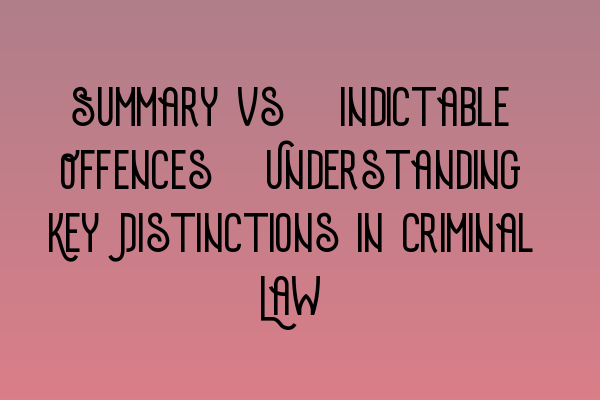Summary vs. Indictable Offences: Understanding Key Distinctions in Criminal Law
When it comes to criminal law, there are various categories of offences based on their severity and complexity. Two common categories of offences in the UK legal system are summary offences and indictable offences. Familiarizing yourself with the key distinctions between these two types of offences is crucial in understanding the criminal justice process and the potential consequences individuals may face.
Summary Offences
Summary offences, also known as minor offences, are less serious offences that are typically heard in a Magistrates’ Court. These offences are generally punishable by a fine, community service, or a shorter prison sentence of up to six months. Examples of summary offences include minor theft, common assault, public order offences, and some driving offences.
It is essential to note that summary offences are subject to certain limitations. For instance, the maximum penalty that can be imposed for a summary offence is determined by the legislation that governs that specific offence. Additionally, there are time limits on prosecuting summary offences, which are typically six months from the date of the alleged offence.
If you are studying for the SQE 1 exam and want to test your knowledge on legal principles related to summary offences, check out our SQE 1 Practice Exam Questions that cover various areas of criminal law.
Indictable Offences
Indictable offences are more serious offences that are usually tried in a Crown Court. These offences carry harsher penalties, including longer prison sentences, and often involve complex legal procedures. Examples of indictable offences include murder, serious assault, drug trafficking, fraud, and robbery.
Indictable offences are typically divided into two categories: those that require a trial by jury and those that can be tried by a judge alone. Offences that require a trial by jury involve a group of randomly selected individuals who listen to the evidence presented in court and determine the defendant’s guilt or innocence.
If you are preparing for the SQE 2 exam and need comprehensive guidance on indictable offences, consider enrolling in our SQE 2 Preparation Courses that cover all the necessary legal knowledge and skills needed to excel in this area of criminal law.
Summary Offences vs. Indictable Offences
There are several key distinctions between summary offences and indictable offences. These distinctions include:
- Severity: Summary offences are generally less severe, while indictable offences are more serious and carry harsher penalties.
- Trial Venue: Summary offences are usually heard in a Magistrates’ Court, while indictable offences are typically tried in a Crown Court.
- Trial Procedure: Summary offences are usually decided by a magistrate or a panel of magistrates, whereas indictable offences may require a jury trial or can be tried by a judge alone.
Understanding the differences between summary and indictable offences is crucial for legal professionals, aspiring solicitors, and anyone interested in criminal law. Knowledge of these distinctions allows individuals to navigate the legal system effectively and provide accurate legal advice to clients.
If you are preparing for the SQE 1 exam and want to simulate real exam conditions, take advantage of our SQE 1 Practice Mocks FLK1 FLK2 that offer comprehensive mock exams covering all the key areas of criminal law.
Conclusion
In summary, understanding the differences between summary and indictable offences is essential in comprehending the UK criminal justice system. Summary offences are less severe and typically heard in a Magistrates’ Court, while indictable offences are more serious and require trial in a Crown Court. Whether you are preparing for the SQE 1 or SQE 2 exams, it is crucial to have a solid understanding of summary and indictable offences to excel in criminal law.
Stay updated with the latest SRA SQE exam dates and other important information by visiting our SRA SQE Exam Dates page.
